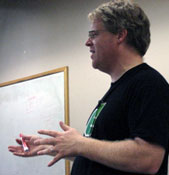Are news outlets mainly going to be aggregators in the future, or are they still going to create content?
 Some of both, Scoble said, pointing out that Newsweek broke the HP story, not a blogger. It's also hard for a blogger to cover Iraq, he added. Big city newspapers and news brands will survive.
Some of both, Scoble said, pointing out that Newsweek broke the HP story, not a blogger. It's also hard for a blogger to cover Iraq, he added. Big city newspapers and news brands will survive.However, that doesn't mean he thinks newsprint will survive.
News brands will stick around, but you're not likely to read it on paper, Scoble said. Newprint is expensive, and so is home delivery, so he thinks the paper side of the news business is going away.
 "I do not read paper," Scoble said. "I don't subscribe to it, I don't read it. Because I can get tomorrow's news today (online)."
"I do not read paper," Scoble said. "I don't subscribe to it, I don't read it. Because I can get tomorrow's news today (online).""I doubt that any one in this class is going to get hired to work on a newspaper," he added, though they may get hired by a newspaper's online side to work for the newspaper brand.
Is MS Office dead? (A loaded question for the former Microsoft evangelist!)
"I don't use Word anymore," Scoble said. "For me, Word is dead. I moved my usage pattern from Word onto Wordpress."
Does he worry about privacy, now that he's become so well known?
"Privacy? I take the Madonna approach," Scoble said. "I'm going to exploit my privacy before anyone else does...everything's out there."
However, he said privacy is going to be a problem, particularly with the MySpace crowd as they come of age to enter the job market.
"Something in society is tilting," Scoble said, adding that in his last four interviews, his interviewers had printed out some of his blog posts and had questions about why he'd said what he said. One of them had about 20 pages of his blog printed out and highlighted.
What that means, Scoble said, is that bloggers and the MySpace generation have got to start thinking in terms of "what's this going to look like in 20 years." On the other hand, he noted, for a lot of media employers, if they can't find you in Google, they're not interested in hiring you.
"Instructors here used to work with students to get lots of clips," Scoble said. "Now, it's blogs."
Is a blog as important as a clip?
Sixty thousand times more important, he said, noting one link from Digg can bring 60 to 80 thousand people to your blog. For example, that's what happened when word got out that he was leaving Microsoft. In addition, if a blog gets linked to, it shows up [on Google and in Technorati]. And, he added, if it's a good blog, others will link to it.
What makes a good blog?
A good blog is passionate and authoritative, said Scoble. It uses links to background information and source information to help establish its credibility and authority.
How is online writing different?
It's a little bit different kind of journalism, Scoble said, not always inverted pyramid style. When you're wriitng for print, you don't have links and you usually don't have photos. Online, there's no length limit. You can put a podcast up with your story, and include photos...and that will get you more links than just repurposing print copy online. It makes it interactive. If you're online, it's almost a necessity to get more media...photos, a video clip, audio...to make it more of a package.
Still hungering for more? Check out JMC student Andrew Venegas' blog post on Scoble's visit (a different take, a better headline), as well as links to his podcast and video of Scoble's presentation to the class. Or download Steve Sloan's podcast of our pre-class conversation with Scoble over burgers and beer.
3 comments:
Great summary of a great discussion! One thing I thought was interesting that he did not mention is that even though it was Newsweek that broke the HP story, I believe they had it online on MSNBC long before it hit the newsstands. I think that there is still a future for printed material, but we will get the breaking news online first and the printed stuff will have to learn how to work along with online sources instead of trying to fight them. Newsweek did a great job with their online coverage, by the time I got the magazine at home the story had changed, and so had their website.
The big question is, will there be a profit model that will be substantial enough to pay the overhead that major media outlets have and allow them to make enough profit to stay in business and compete with low overhead and independent practitioners of new media? Sorry for the long sentence, but that is still the $64K question to me.
Great report!
Great bloog
Post a Comment